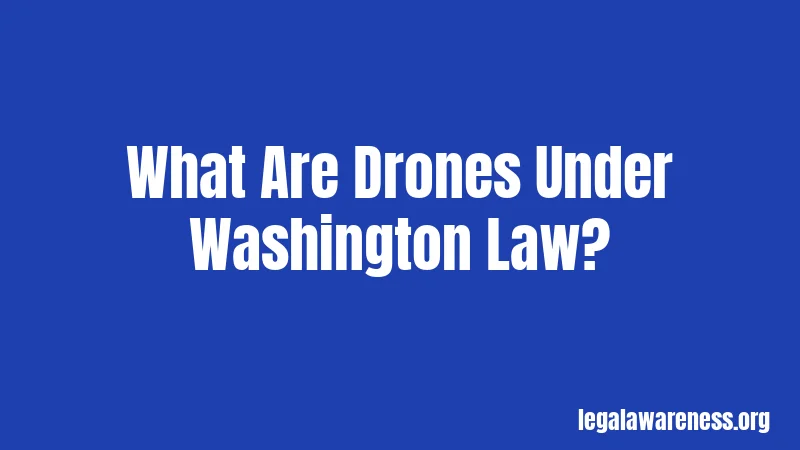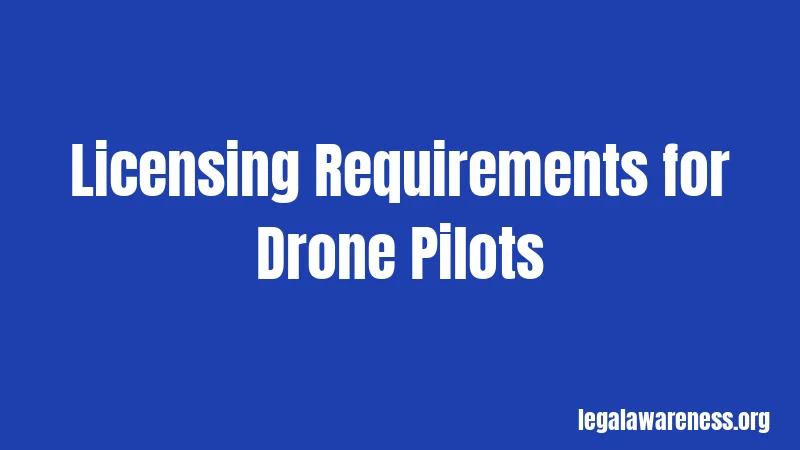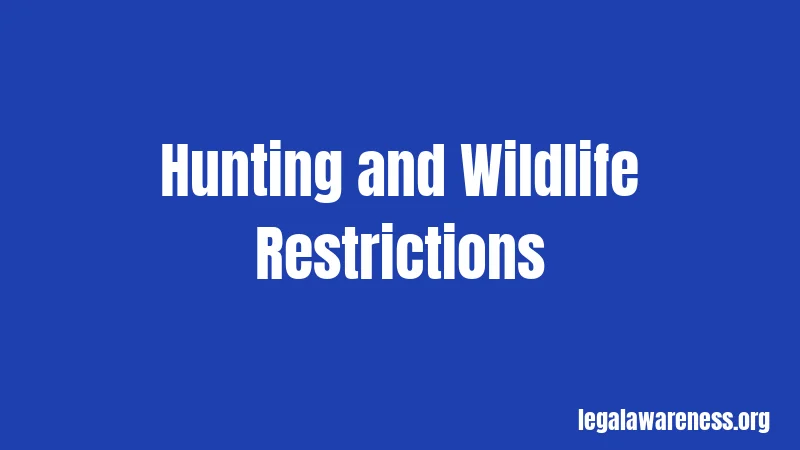Drone Laws in Washington (2026): Your Complete Flight Guide
Most people think they can just fly their drone anywhere. That’s not quite how it works. Washington has specific rules about where you can fly, when you need permits, and what happens if you break the law. Let’s break it down so you know exactly what’s allowed.
Honestly, this is the part most people miss. Washington combines federal FAA rules with its own state regulations. That means you need to follow both. Don’t worry though, we’ll make it simple.
What Are Drones Under Washington Law?

A drone is an unmanned aircraft that someone controls remotely. The official term is “unmanned aircraft system” or UAS. Washington law defines it as an aircraft operated without anyone inside it. Pretty straightforward.
These flying devices come in all sizes. Some weigh less than half a pound. Others can weigh up to 55 pounds for recreational use. Commercial drones follow the same weight limits.
Basic Registration Requirements
Here’s the deal. You need to register your drone if it weighs more than 0.55 pounds (250 grams). That’s about the weight of a smartphone.
The FAA requires federal registration. This costs $5 and lasts three years. You register online at the FAA’s DroneZone website. Takes about five minutes.
But wait, there’s more. Commercial drone pilots have an additional requirement. Washington state requires you to register with the Washington State Department of Transportation (WSDOT). This costs $15 per year per drone. The law went into effect on April 1, 2022.
Wondering if this applies to you? If you fly for fun only, you just need FAA registration. If you make any money from your drone flights, you need both registrations.
Licensing Requirements for Drone Pilots

Recreational Pilots
Flying for fun? You need to pass the TRUST test. TRUST stands for The Recreational UAS Safety Test. It’s free and takes about 30 minutes online. The test covers basic safety rules and airspace knowledge.
You only take it once. After passing, you get a certificate. Keep a copy with you when flying. Digital copies on your phone work fine.
Commercial Pilots
Making money with your drone changes everything. You need a Part 107 Remote Pilot Certificate from the FAA. This requires passing an aeronautical knowledge test at an FAA-approved testing center.
The test costs around $175. You’ll study topics like airspace, weather, and drone operations. Many pilots use online courses to prepare. The pass rate is good if you study properly.
Your certificate lasts two years. After that, you take a recurrent test to renew it.
Where You Can (And Can’t) Fly
State Parks
State parks in Washington basically ban drones. You need written permission from the director or their designee. This applies to every state park.
Applications must be submitted at least 60 days before your planned flight. There’s a $25 non-refundable application fee. Commercial filming requires an additional special permit.
The state takes this seriously. Park staff can ask to see your permit. If you don’t have one, you’ll be asked to leave.
National Parks
National parks are completely off-limits. Mount Rainier, Olympic, and North Cascades National Parks all prohibit drones. No exceptions for recreational pilots.
This rule comes from the National Park Service. Breaking it can result in federal fines and confiscation of your drone.
National Forests
Good news here. National forests like Okanogan-Wenatchee and Gifford Pinchot generally allow drone flights. You still need to follow FAA rules and avoid disturbing wildlife.
Some specific areas within national forests may have restrictions. Check with the local ranger station before flying.
State Capitol Campus
The state capitol in Olympia is a no-fly zone. You cannot launch, land, or operate a drone anywhere within the capitol campus boundaries.
Exceptions exist only for law enforcement, emergency response, and national defense activities. These require advance approval from the director.
Private Property
Flying over someone’s private property gets tricky. Technically, the FAA controls all airspace above the ground. But Washington takes privacy seriously.
You should get permission before flying over private property. Property owners can report you to law enforcement if they feel their privacy is violated. You could face trespassing charges or civil lawsuits.
Stay away from windows. Don’t hover over backyards. And definitely avoid recording people without their consent.
Cities and Local Rules
Many Washington cities have their own drone rules. Seattle requires filming permits for flights over city property. Bellevue bans drones in all city parks. Tacoma and Spokane have similar restrictions.
Always check local ordinances before flying in urban areas. What’s legal in one city might be banned in another.
Hunting and Wildlife Restrictions

This one’s important. You cannot use a drone for hunting in Washington. Period.
State law prohibits using unmanned aircraft to spot, locate, or report wildlife locations for hunting purposes. You also can’t hunt game animals, game birds, or migratory birds on the same day you’ve operated a drone.
Using a drone to pursue, concentrate, or harass any wild animal or bird is illegal. The only exception is if the Washington Department of Fish and Wildlife authorizes it for wildlife conflict management.
These aren’t just suggestions. Breaking these rules is a criminal misdemeanor. You could face fines and lose your hunting privileges.
Privacy Laws and Regulations
Washington has strong privacy protections. You cannot use drones in areas where people have a reasonable expectation of privacy. These include:
Restrooms and locker rooms. Residential buildings and individual rooms. Changing or dressing rooms. Health treatment facilities. Campus daycare centers. University offices and work areas.
You also can’t use drones to monitor or record information on computer screens or other electronic displays. This protects institutional and personal data.
Flying low over residential neighborhoods raises privacy concerns. Even if you’re in legal airspace, recording people through windows or in their yards can lead to legal trouble.
Sound complicated? It’s actually not. Just respect people’s privacy. If you wouldn’t want someone filming you, don’t film others.
Controlled Airspace and LAANC
Seattle has busy airspace because of SeaTac International Airport. Flying near airports requires authorization.
The FAA uses a system called LAANC (Low Altitude Authorization and Notification Capability). This lets you request instant airspace authorizations in controlled airspace. Most requests are approved within seconds.
Download a LAANC-approved app on your phone. Popular options include Aloft, Airmap, and Kittyhawk. These apps show you where you can fly and handle authorization requests.
Never fly near airports without authorization. The penalties are severe and include potential criminal charges.
Military and Restricted Areas
Several military installations operate in Washington. Joint Base Lewis-McChord has a large restricted area. The Hanford nuclear reservation is also off-limits.
Hydropower facilities along the Columbia River often have flight restrictions. These count as critical infrastructure. Flying too close can trigger security responses.
Check your drone app before every flight. Restricted zones are clearly marked on FAA maps.
The Olympic Coast National Marine Sanctuary
Here’s one most people don’t know about. The Olympic Coast National Marine Sanctuary covers almost the entire northern Washington coast.
NOAA regulations prohibit flight operations below 2,000 feet above ground level over designated sanctuary areas. This protects marine wildlife and ecosystems.
Breaking this rule violates federal regulations. Stick to higher altitudes if flying along the coast.
Penalties for Breaking Drone Laws
Federal Violations
The FAA can impose civil penalties up to $1,100 per violation for recreational pilots. Commercial pilots face fines up to $27,500 per violation. Criminal penalties can include fines up to $250,000 and three years in prison for serious violations.
State Violations
Washington can charge you with criminal and civil penalties for careless or reckless drone operations. Operating without proper state registration (for commercial pilots) can result in fines and enforcement actions.
Flying in prohibited state areas without permits leads to citations and potential confiscation of your equipment.
Local Violations
Cities and counties can issue their own fines for breaking local drone ordinances. These typically range from $100 to $500 per violation. Repeated violations can lead to higher penalties.
Commercial Drone Operations
Commercial pilots have extra responsibilities. Besides Part 107 certification and state registration, you need to follow these rules:
Maintain visual line of sight with your drone. Fly only during daylight unless you have a night waiver. Don’t fly over people unless you have specific waivers. Maximum altitude is 400 feet above ground level. Maximum speed is 100 mph.
You can apply for waivers to exceed some of these limits. The FAA reviews each waiver request individually.
Insurance Recommendations
Washington doesn’t require drone insurance. But it’s honestly a good idea. Accidents happen. Your drone could crash into someone’s car or injure a person.
Liability insurance for drones is relatively affordable. Many policies cost $500 to $1,000 per year and provide $1 million in coverage. Some homeowner’s policies cover recreational drone use, but check first.
Commercial pilots should definitely get insurance. Many clients require proof of coverage before hiring you.
Remote ID Requirements
Starting in 2023, the FAA requires Remote ID on most drones. Remote ID broadcasts your drone’s location and your control station location. Think of it like a digital license plate.
Most new drones come with Remote ID built in. Older drones need a Remote ID module attached. You can buy these for $50 to $200.
Some drones are exempt. Very small drones under 250 grams flown only for recreation don’t need Remote ID. But most pilots will need it.
Best Practices for Flying in Washington
Check the weather before flying. Washington gets rain, wind, and changing conditions. Bad weather makes flying dangerous.
Use a pre-flight checklist. Check your drone’s battery, propellers, and camera. Make sure your controller is charged. Test all controls before takeoff.
Start with open areas away from people. Practice your flying skills in safe locations. Parks that allow drones (with proper permits) are good practice spots.
Respect wildlife. Keep your distance from animals. Drones can stress wildlife even if you’re just taking photos. Give them space.
Be considerate of others. Not everyone loves drones. If people ask you to stop flying near them, be polite. Find another location.
How to Get Permits for State Parks
The process is straightforward. Contact the specific state park where you want to fly. Request the Remote Controlled Aircraft Permit Application. This is available on the Washington State Parks website.
Fill out the application completely. Include your flight plan, dates, times, and purpose. Explain why you need to fly in the park.
Submit the application at least 60 days before your planned flight date. Include the $25 non-refundable application fee.
Wait for approval. The park staff will review your request and may add specific conditions or restrictions. If approved, keep a copy of the permit with you during your flight.
Reporting Drone Incidents
If your drone crashes or causes damage, report it. The FAA has an accident reporting system for drone incidents.
You must report accidents that cause serious injury or property damage over $500. Reports help improve drone safety for everyone.
If you see someone flying dangerously, you can report it to local law enforcement or the FAA. Include as much detail as possible about the location, time, and what happened.
Resources and Contacts
FAA Resources
DroneZone website for registration: faa.gov/uas/getting_started
B4UFLY app for checking airspace
FAA Safety Team (FAAST) for training
Washington State Resources
WSDOT Aviation Division: wsdot.wa.gov/travel/aviation
Secure Access Washington (SAW) portal for commercial registration
Washington State Parks: parks.wa.gov
Emergency Contacts
Report dangerous drone operations: Call 911
FAA Hotline: 1-866-TELL-FAA (1-866-835-5322)
WSDOT Aviation: 360-651-6300
Frequently Asked Questions
Do I need a license to fly a drone in Washington?
Recreational pilots need to pass the free TRUST test. Commercial pilots must obtain an FAA Part 107 certificate. Both require federal drone registration for aircraft over 0.55 pounds.
Can I fly my drone in Seattle?
Yes, but Seattle has controlled airspace near SeaTac Airport. You’ll need LAANC authorization for most flights. The city also requires filming permits if you’re operating over city property.
Are drones allowed in Washington State Parks?
Only with written permission from the park director. You must apply at least 60 days in advance and pay a $25 application fee. Commercial filming requires additional permits.
Can I fly over private property?
Technically yes under FAA rules, but Washington privacy laws protect property owners. Get permission before flying over private land. You can face legal consequences for privacy violations.
What happens if I fly without registration?
The FAA can fine you up to $27,500 for unregistered operation. Washington state can add its own penalties for commercial pilots who don’t register with WSDOT.
Final Thoughts
Washington offers amazing scenery for drone pilots. From coastal views to mountain peaks to city skylines, the opportunities are incredible. But you need to follow the rules.
Get your registrations done. Pass the required tests. Check airspace before every flight. Respect privacy and wildlife. Get permits when needed.
Stay informed, stay safe, and fly responsibly. When in doubt, research the specific location or contact the local land manager. It’s better to ask first than face penalties later.
Happy flying!
References
- Federal Aviation Administration – Recreational Flyers & Modeler Community-Based Organizations: https://www.faa.gov/uas/recreational_flyers
- Federal Aviation Administration – Part 107 Small UAS Rule: https://www.faa.gov/uas/commercial_operators
- Washington State Department of Transportation – Drones & Unmanned Aircraft Systems: https://wsdot.wa.gov/travel/aviation/drones-unmanned-aircraft-systems-uas
- Washington Administrative Code 352-32-130 – Remote controlled aircraft in state parks: https://app.leg.wa.gov/wac/default.aspx?cite=352-32-130
- Washington Administrative Code 220-413-070 – Hunting with aid of aircraft, boats or other vehicles: https://app.leg.wa.gov/wac/default.aspx?cite=220-413-070
- Washington State Parks – Remote Controlled Aircraft Permit: https://parks.wa.gov/passes-permits/permits/remote-controlled-aircraft-permit
- Revised Code of Washington 47.68.250 – Registration of aircraft: https://app.leg.wa.gov/rcw/default.aspx?cite=47.68.250
